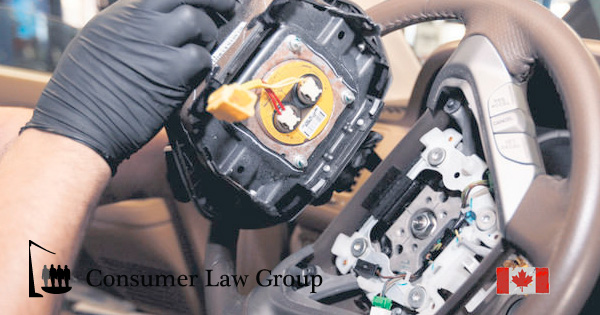ARC Airbag Inflator Defect Class Action
-
QC May 23, 2023 [en]
Application for Authorization
CONSUMER LAW GROUP has launched a class action lawsuit against ARC, Joyson Safety Systems and Toyoda Gosei as well as General Motors, Ford, Volkswagen, Audi, BMW, Porsche, Hyundai, Kia, and FCA (Chrysler), on behalf of individuals who purchased or leased one or more of these defective vehicles containing a defective airbag manufactured with a defective inflator manufactured by ARC. These airbags are manufactured with what is called a toroidal hybrid airbag inflator designed by ARC.
It is estimated that approximately 3 million Canadians are driving vehicles that contain a potentially deadly threat – airbag inflators that can explode in a collision and emit shrapnel.
There have been at least two deaths so far in the United States and Canada and at least seven injuries due to ARC’s faulty inflators. The explosions, which first began in 2009 are ongoing. The affected vehicles include a 2002 Chrysler Town and Country minivan, a 2004 Kia Optima, a 2010 Chevrolet Malibu, two 2015 Chevrolet Traverses, a 2016 Audi A3, and a 2017 Chevrolet Traverse.
One of these tragic deaths was Marlene Beaudoin, a 40-year-old mother of 10 from Michigan who was struck by metal fragments when her 2015 Chevrolet Traverse SUV was involved in a minor crash in 2021.
Currently, there is a dispute between federal regulators in the United States (the National Highway Traffic Safety Administration, “NHTSA”) and ARC relating to a potential recall with ARC refusing to do so.
In its letter to ARC, NHTSA wrote:
“NHTSA is issuing this recall request letter to notify you that the Agency has tentatively concluded that a defect related to motor vehicle safety exists in the frontal driver and passenger air bag inflators under investigation that were produced before installation of borescopes on all toroidal inflator manufacturing lines in January 2018 (“subject inflators”), and to demand that ARC issue a Part 573 Recall Report addressing that safety defect.”
After an eight-year investigation, the NHTSA concluded that these inflators are defective, which date from at least the 2002 model year to January 2018, when ARC installed equipment on its manufacturing lines that could detect potential safety problems.
ARC maintains that no safety defect exists.
The Wall Street Journal has identified dozens of car models that have the potentially explosive airbag inflators, using government records filed as part of a defects investigation. Here is a list of vehicles that companies have told regulators have the airbag part covered by the probe:
- Audi A3, Model Years 2015-2017
- Audi A3 E-Tron, Model Year 2016
- Audi S3, Model Year 2016
- Audi TT, Model Years 2016-2017
- Audi R8, Model Years 2016-2017
- BMW i3, Model Year 2014-2017
- BMW X1 SAV, Model Years 2016-2017
- BMW X5 SAV, Model Years 2014-2017
- BMW X6 SAV, Model Years 2015-2017
- Buick Enclave, Model Years 2008-2017
- Buick LaCrosse, Model Year 2005
- Buick LeSabre, Model Years 2002-2005
- Buick Rendezvous, Model Years 2003-2005
- Cadillac CTS, Model Years 2003-2005
- Cadillac DeVille, Model Years 2003-2005
- Cadillac SRX, Model Years 2004-2005
- Cadillac STS, Model Year 2005
- Cadillac XLR, Model Years 2004-2005
- Chevrolet Cavalier, Model Years 2000-2005
- Chevrolet Corvette, Model Year 2005
- Chevrolet Equinox, Model Year 2005
- Chevrolet Express 1500, Model Years 2003-2005
- Chevrolet Express 2500, Model Years 2002-2005
- Chevrolet Express 3500, Model Years 2002-2005
- Chevrolet SSR, Model Years 2003-2005
- Chevrolet Venture, Model Years 2004-2005
- Chevrolet Malibu, Model Years 2004-2005; 2010-2011
- Chevrolet Traverse, Model Years 2013-2017
- Ford Mustang, Model Year 2017
- Ford F-150, Model Year 2017
- GMC Savana 1500, Model Years 2003-2005
- GMC Savana 2500, Model Years 2002-2005
- GMC Savana 3500, Model Years 2002-2005
- GMC Acacia, Model Years 2014-2017
- Hyundai XG350, Model Years 2002-2005
- Hyundai Tucson, Model Year 2005
- Hyundai Tiburon, Model Years 2003-2005
- Kia Optima, Model Years 2001-2005
- Kia Sportage, Model Year 2005
- Mini Cooper, Model Years 2014-2017
- Pontiac Bonneville, Model Years 2003-2005
- Pontiac G6, Model Year 2005
- Pontiac Montana, Model Year 2003-2005
- Pontiac Sunfire, Model Year 2001-2005
- Porsche Macan, Model Years 2015-2017
- Porsche Panamera, Model Year 2017
- Saturn Vue, Model Years 2002-2005
- Volkswagen Golf, Model Year 2015-2017
So far, Transport Canada has issued many recalls, but only on the following vehicles:
- Audi A3, Model Year 2016
- Audi A3 E-Tron, Model Year 2016
- Audi S3, Model Year 2016
- Audi TT, Model Year 2016
- BMW 1 Series, Model Year 2012-2013
- BMW 3 Series, Model Years 2008-2013
- BMW X1, Model Years 2013-2014
- BMW X5, Model Years 2007-2013
- BMW X6, Model Years 2011, 2013-2014
- Buick Enclave, Model Years 2012, 2014-2017
- Cadillac Escalade and Escalade ESV, Model Years 2010-2014
- Chevrolet Silverado HD, Chevrolet Suburban, Chevrolet Tahoe, Model Years 2010-2014
- Chevrolet Malibu, Model Years 2010-2011
- Chevrolet Traverse, Model Years 2014-2017
- Ford Edge, Model Years 2007-2010
- Ford Fusion, Model Years 2006-2012
- Ford GT, Model Years 2005-2006
- Ford Mustang, Model Years 2005-2014
- Ford Ranger, Model Years 2007-2011
- Ford MKX, Model Years 2006-2010
- Ford MKZ, Model Years 2007-2012
- GMC Acadia, Model Years 2014-2017
- GMC Sierra, Model Years 2010-2013
- GMC Sierra HD, GMC Yukon and GMC Yukon XL, Model Years 2010-2014
- Hyundai Elantra, Model Year 2009
- Porsche 911 Carrera, Model Years 2022, 2023
- Porsche 911 GT3, Model Year 2023
- Volkswagen Golf, Model Year 2016
- Volkswagen Golf R, Model Year 2016
- Volkswagen Golf Wagon, Model Year 2016
- Volkswagen GTI, Model Year 2016
As a result of the defect in the design of the airbags in at least these vehicles, members of the class were harmed and suffered actual damages; they did not receive the benefit of their bargain, and instead purchased or leased vehicles that are of a lesser standard, grade, and quality than represented, and did not receive vehicles that met ordinary and reasonable consumer expectations regarding safe and reliable operation. Purchasers or lessees of the affected vehicles paid more, either through a higher purchase price or higher lease payments, than they would have had the defect been disclosed. They were deprived of having a safe, defect-free airbag installed in their vehicles, and ARC and the above vehicle manufacturers unjustly benefited.
If you or someone you know has owned or leased one of the vehicles listed above equipped with a defective airbag and you wish to obtain more information on potential compensation or to be kept advised of the status of the ARC Airbag Defect Class Action litigation or any resulting compensation resulting from the Class Action Lawsuit, please provide your contact information to our law firm using the below form and please indicate which vehicle you currently, or in the past, own(ed) or lease(d).
IF YOU WISH TO JOIN THE CLASS ACTION OR TO SIMPLY GET MORE INFORMATION, PLEASE COMPLETE THE FORM BELOW. Please note that providing your information creates no financial obligation for you. You are not charged any fee or cost for joining this class action. Our law firm is paid a contingency fee from the compensation recovered, only if the class action is successful. All information contained in this transmission is confidential and Consumer Law Group agrees to protect this information against unauthorized use, publication or disclosure.



 Passer au français
Passer au français


